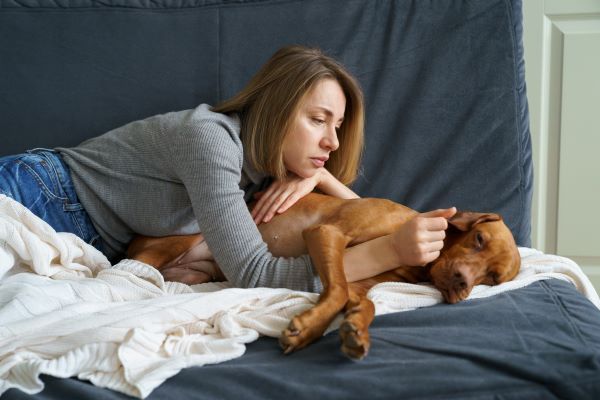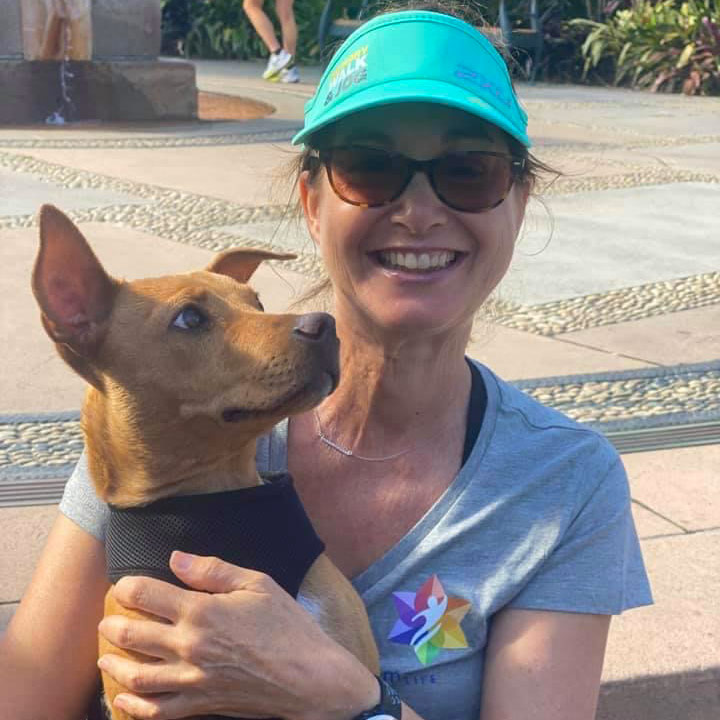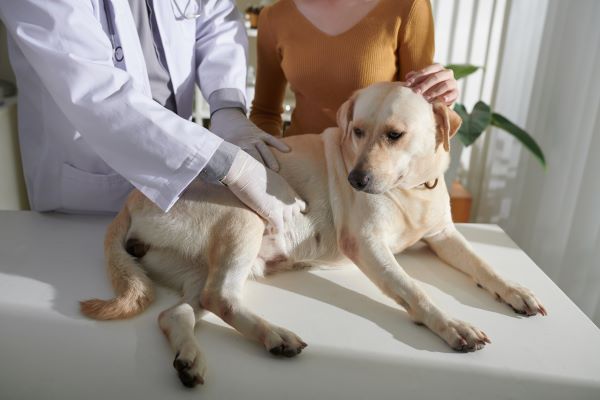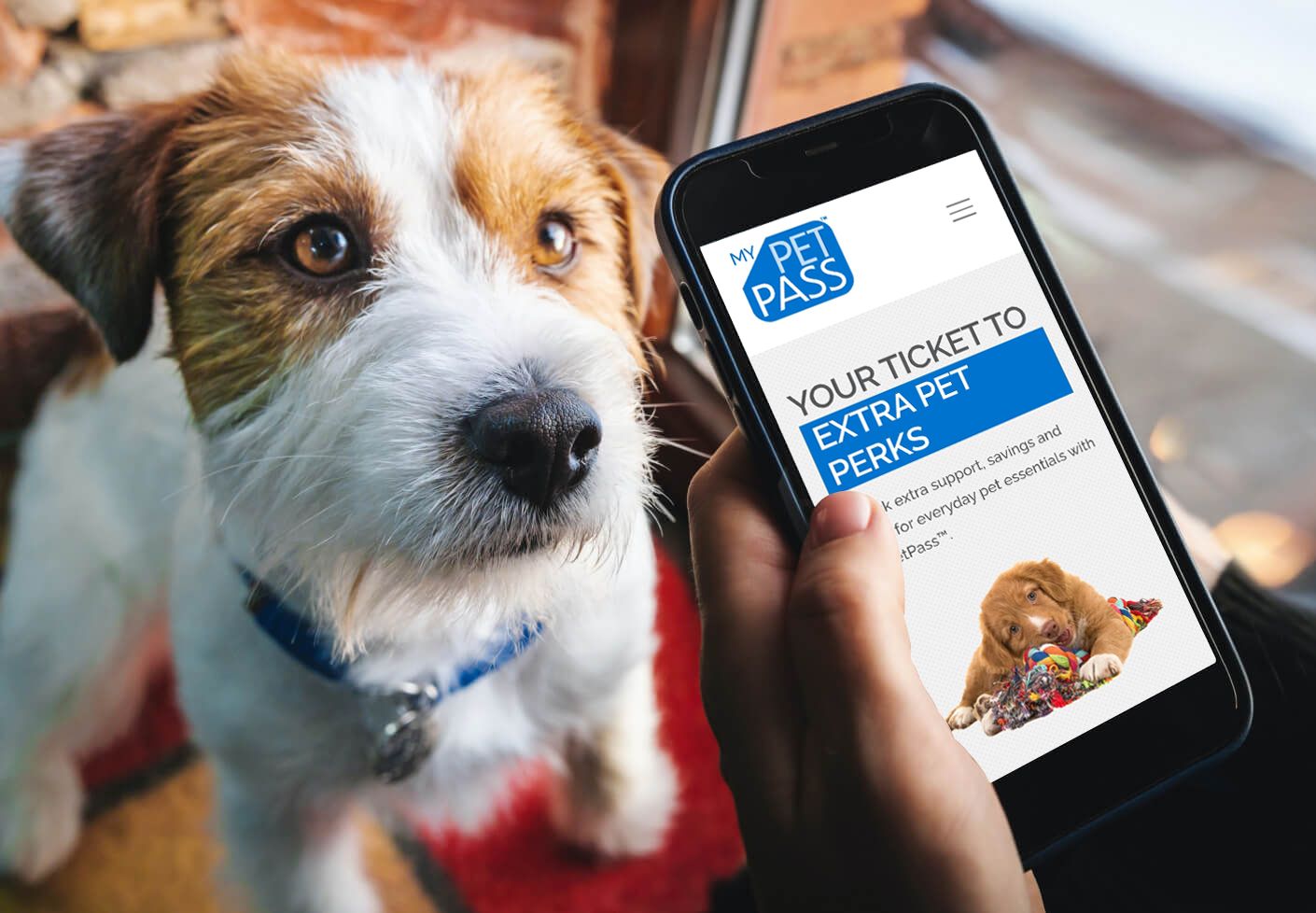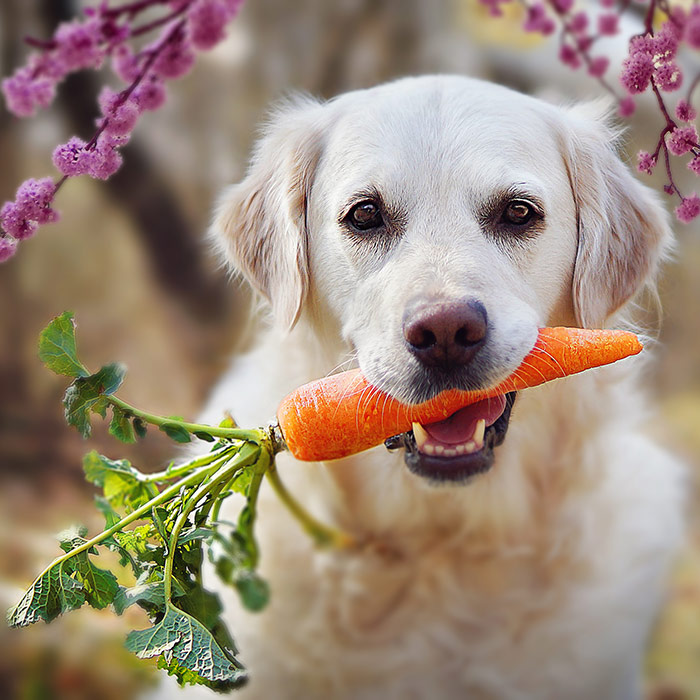Doggy tummy troubles? A dog owner’s guide to gastro

Summary
Gastroenteritis is a common digestive issue in dogs characterised by inflammation of the stomach and intestines. It often results in vomiting, diarrhoea, or both. While the symptoms can be distressing, with prompt and proper care, most dogs make a full recovery. According to PetSure claims data (2024), the average cost of treatment for Gastroenteritis for dogs was $738Ø.
Gastroenteritis in dogs
It’s a horror story that almost every pooch parent can relate to – the dreaded tummy troubles and resulting puddles of poo or spew to deal with. Of course, it’s also very worrying to see your beloved pup suddenly go off their food, lose their energy, vomit, or have diarrhoea. Digestive upset in dogs happens more often than people realise, and one of the most common conditions behind it is gastroenteritis.
 Gastroenteritis, the fancy name for a not-so-fancy upset stomach, can strike suddenly and make even the happiest dog (and the human who has to clean up after them!) feel miserable. It can appear suddenly or develop gradually, and the severity varies depending on the cause. Puppies, senior dogs, and pets with weaker immune systems tend to be more at risk.
Gastroenteritis, the fancy name for a not-so-fancy upset stomach, can strike suddenly and make even the happiest dog (and the human who has to clean up after them!) feel miserable. It can appear suddenly or develop gradually, and the severity varies depending on the cause. Puppies, senior dogs, and pets with weaker immune systems tend to be more at risk.
The good news is that most cases are short-lived, and a little knowledge of the symptoms, causes, and treatments can help ensure the health and wellbeing of your furry family member (not to mention your delight at being to pick up – not mop up – after your doggo!). This guide covers everything from causes to prevention, so you’re prepared if your dog ever faces this common issue.
Symptoms of gastroenteritis in dogs
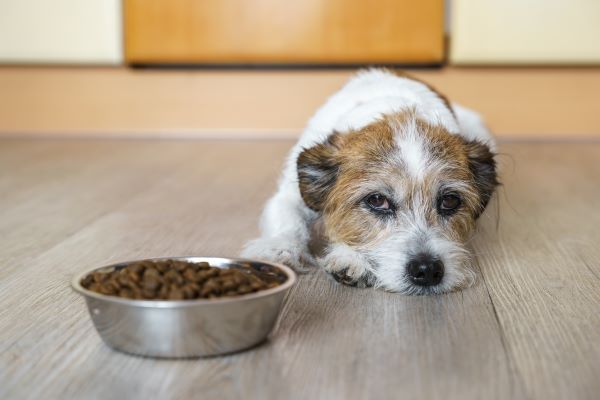
You can’t confirm gastroenteritis at home with 100% certainty, but you can suspect it based on certain symptoms. Gastro affects the stomach and intestines, so most symptoms involve digestive upset. These can range from mild to severe and may appear suddenly or gradually.
Spotting the signs early gives your dog the best chance at recovery. Here are the symptoms to look out for.
This can appear suddenly, sometimes with food, mucus, or bile. The frequency and contents of vomit can offer clues about the severity.
Loose or watery stools, occasionally with mucus or blood, are typical. In cases like haemorrhagic gastroenteritis in dogs, the presence of blood should never be ignored.
- Loss of appetite
Skipping meals or turning away from favourite treats often indicates nausea or abdominal discomfort.
- Lethargy
If your dog becomes withdrawn or sluggish, it may be a sign that the body is focusing on fighting off inflammation or infection.
- Dehydration
Vomiting and diarrhoea quickly lead to fluid loss. Signs include dry gums, sticky saliva, and decreased skin elasticity.
These symptoms don’t confirm gastroenteritis on their own, but they signal that something isn’t right and should prompt a vet visit if they persist.
When to call the vet
Some of the symptoms of gastro overlap with more serious conditions, such as intestinal blockage and pancreatitis, so it’s important to see the vet if they occur. If your dog vomits three or more times in 24 hours, has watery diarrhoea six or more times in a day, or you see any blood in stool or vomit, call your vet promptly.
Unsure how serious it is?
Bow Wow Meow policyholders can get access to trusted vet care anytime, anywhere, at no additional cost. Connect to an experienced Australian registered vet via video call, 24/7. Whether it’s providing vet advice, setting up at-home treatment plans, or confirming if you need to visit a vet in person, you can get help when you need it.
Find out more about our pet insurance cover options.
Causes of gastroenteritis in dogs – from bin raids to bad bacteria
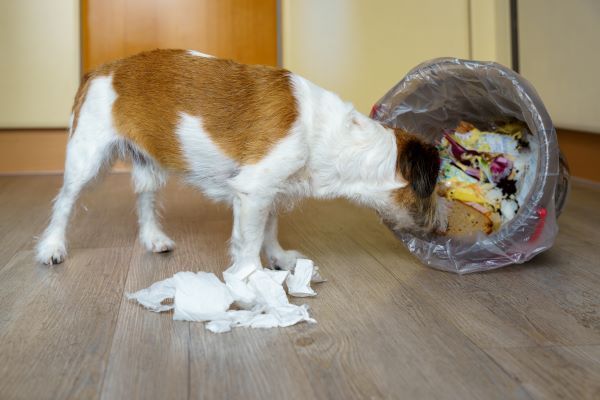
Gastroenteritis in dogs can occur for many reasons, ranging from something as simple as eating spoiled food to more serious infections or underlying health conditions. Identifying what triggers gastroenteritis helps reduce your dog’s risk.
Here are some of the common reasons why dogs develop tummy troubles:
1. Dietary indiscretion – eating something they shouldn’t
Dogs are notorious for eating things they shouldn’t. Leftovers, fatty snacks, and even non-food items can inflame the gut. To avoid this, it helps to understand good and bad foods for dogs, especially in multi-pet homes or with young children around.
2. Germs and bugs
- Bacterial Infections
Pathogens like Salmonella, E. coli, or Clostridium perfringens can cause gastroenteritis when dogs come into contact with spoiled food, contaminated water, or faeces. Scavenging, bin-diving, or drinking from puddles are common ways bacteria find their way in.
- Viral infections
Viruses such as parvovirus or canine coronavirus can lead to intense gastrointestinal symptoms. These are usually more severe and often affect puppies or unvaccinated dogs more aggressively.
- Parasitic infections
Parasites like Giardia, roundworms, or hookworms irritate the intestinal lining. Dogs with acute gastroenteritis caused by parasites may show symptoms that come and go or worsen suddenly. Routine parasite prevention is essential.
3. Toxins and poisons
Ingesting toxic substances—such as certain human foods (chocolate, grapes, onions), household chemicals, or poisonous plants—can irritate the digestive tract and even damage internal organs. Just a small amount can be dangerous, so quick veterinary intervention is essential.
4. Food allergies or intolerances
Some dogs develop sensitivity to specific ingredients, such as certain proteins or grains. These intolerances can cause chronic or recurring gastroenteritis, often accompanied by itchy skin, flatulence, or irregular bowel movements.
5. Stress and anxiety
Routine changes, separation, or even new pets in the home can trigger stress. In some dogs, emotional upset affects digestion and may lead to or worsen gastroenteritis.
6. Underlying medical conditions
Chronic conditions such as inflammatory bowel disease (IBD), pancreatitis, liver disease, or kidney problems may present as ongoing or recurring tummy troubles.
How common is gastro in dogs?
According to PetSure claims dataØ, in 2024 gastroenteritis was the second most claimed condition in dogs. It affected dogs of all ages, but occurred more often in puppies and senior dogs.
Diagnosis of Gastroenteritis in Dogs
When symptoms appear, an accurate diagnosis guides treatment and rules out other serious problems. The vet may conduct a variety of diagnostic tests, including:
Physical exam
Because gastroenteritis can be caused by many different factors, your vet will start with a physical examination, which may include checking hydration, abdominal pain, temperature, and overall condition.
History
Prepare to chat about what they last ate, recent changes, and any odd symptoms. This helps identify potential triggers, such as sudden dietary or environmental changes, scavenging, or toxin exposure.
Faecal analysis
Testing a stool sample helps detect parasites or harmful bacteria. If identified, this directs treatment more precisely.
Blood tests
These help assess inflammation, infection, and organ function. In cases of haemorrhagic gastroenteritis, bloodwork may also reveal electrolyte imbalances.
Imaging techniques
X-rays or ultrasound are used if symptoms persist or if ingestion of foreign objects is suspected. In Australia, veterinarians often rely on both bloodwork and imaging to diagnose gastroenteritis early. This is particularly helpful when distinguishing more serious cases like acute gastroenteritis from milder digestive upset.
Diagnosis not only confirms the cause, it also shapes the treatment plan and reduces the chance of overlooking more serious problems.
Cost of Gastroenteritis treatment for dogs
According to PetSure claims data (2024), the average cost of treatment for Gastroenteritis for dogs was $738Ø.
These costs vary depending on the condition and treatment complexity. Pet insurance can help you manage unexpected expenses. Learn more about Cover Options and Routine Care Cover to support your dog’s ongoing health.
Are some breeds more likely to get gastro than others?
According to PetSure claims data, in 2024 gastro occurred more often in Golden Retrievers, French Bulldogs and Cavoodles than other breeds.
Treatment of gastroenteritis in dogs
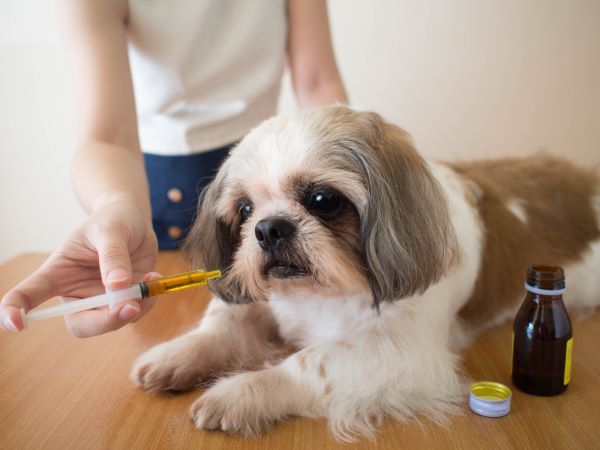
Treatment depends on the severity of symptoms and underlying cause, but the main goal is to restore hydration, ease discomfort, and allow the digestive system to recover. Here’s what may occur when your dog begins recovery.
1. Fluid therapy
 Dehydrated dogs may need fluids under the skin or intravenously. This stabilises their condition and supports faster healing, especially in cases of acute gastroenteritis.
Dehydrated dogs may need fluids under the skin or intravenously. This stabilises their condition and supports faster healing, especially in cases of acute gastroenteritis.
Rehydration is the cornerstone of treatment, as vomiting and diarrhoea can quickly lead to dehydration. Mild cases may be managed with oral rehydration at home, while more severe cases require intravenous (IV) fluids at the vet clinic to restore electrolyte balance.
2. Medications
Depending on the cause and severity, vets may prescribe:
- Anti-nausea drugs to help control vomiting and reduce nausea
- Antidiarrhoeal medications to reduce fluid loss
- Probiotics may assist in shortening diarrhoea or restoring a healthy gut microbiome, especially after infections or antibiotic treatments
- Antibiotics are not routinely needed for uncomplicated cases, only if a bacterial infection or systemic illness is confirmed
3. Dietary management
Adult dogs are often placed on a short period of fasting (usually 12 to 24 hours) followed by a bland diet of small, easily digestible meals, often boiled chicken and rice or a prescription diet, then a gradual return to regular food. If you have a puppy, toy breed or diabetic dog, avoid fasting and consult your vet for advice.
4. Addressing underlying causes
If gastroenteritis is linked to parasites, toxins, food allergies or another illness, treatment will target that specific cause. For example, deworming medication for parasites or supportive care for pancreatitis.
Timely care leads to faster healing. Partnering with your vet ensures your dog gets the support they need from the start. This is especially true for cases of gastroenteritis in dogs in Australia, where rapid dehydration can be more common due to warmer climate conditions.
How much does treatment for gastro cost?
Treatment costsØ have climbed, averaging $737 in 2024, up from $619 in 2022. Severe cases can cost significantly more, with the highest cost for treatment in 2024 reaching as much as $32,310.
Home care for dogs with gastroenteritis

Here are some things that you can do to help your dog recover and make them more comfortable:
1. Gradually return to a normal diet
Follow your vet’s instructions on reintroducing food. Usually, dogs start with a bland diet for several days before transitioning back to their regular food. Make dietary changes gradually to avoid upsetting the stomach again.
2. Encourage hydration
Ensure fresh water is always available and encourage small, frequent sips. If your dog won’t drink, your vet may recommend oral electrolyte solutions to help maintain fluid balance.
3. Monitor symptoms
Keep a close eye on your dog’s appetite, energy levels, vomiting, and stool consistency. A simple diary of these signs can help you and your vet track progress.
4. R & R
Provide a quiet, comfortable space where your dog can rest undisturbed. Limit strenuous activity until they have fully recovered.
How long does gastro in dogs last?
The good news is that most cases of gastroenteritis in dogs don’t stick around for long, especially if you act quickly.
-
Mild cases – if the culprit is something minor (like raiding the compost bin or gobbling a bit of greasy BBQ), symptoms often improve within 24 to 48 hours once your pooch is on a bland diet and drinking fluids.
-
Moderate cases – if infection or more stubborn inflammation is involved, expect recovery to take around three to five days, even with prompt vet care.
-
Severe or complicated cases – if gastroenteritis is linked to a more serious issue, such as parvovirus, pancreatitis, or an intestinal blockage, your dog may need a week or more to recover, plus possible hospital care.
Even after the worst is over, your dog might be a little quieter or have slightly softer stools for a few days as their digestive system gets back to normal. If things don’t improve within two days, symptoms get worse, or they bounce back and then relapse, it’s time for a vet visit.
Is it acute or chronic?
Acute gastroenteritis is a sudden-onset condition and is often caused by eating harmful items (e.g. table scraps or garbage), infections such as parvovirus or protozoa infestation (e.g., Giardia), or even stress.
Chronic gastroenteritis develops over time and is typically triggered by food allergies, underlying diseases, or persistent exposure to stressors.
Prevention of fastroenteritis in dogs

While not all cases are preventable, these habits significantly lower the risk of gastroenteritis in dogs.
- Proper nutrition
Feed a balanced, appropriate diet. Avoid human scraps, especially rich or spicy foods. If unsure, consult this guide tofoods dogs can eat.
- Regular veterinary check-ups
Early detection and routine parasite control reduce risk. Preventive care is often included inRoutine Care Cover, so it’s worth checking your plan.
- Avoiding exposure to contaminants
Prevent access to rubbish, spoiled food, or stagnant water. Supervised walks and bin-proofing your home reduce accidental exposure.
- Stress management
Routine, play, and a secure space reduce emotional triggers that may upset digestion. Dogs prone to stress may benefit from gradual changes and consistent attention.
These habits reduce the likelihood of illness and support better long-term digestive health.
